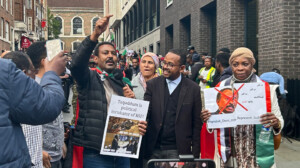Funeral for victims of North Darfur sit-in attack
On Tuesday afternoon, thousands of people attended the burial of the 10 people killed during the attack on the sit-in in Fata Borno camp for the displaced in North Darfur’s Kutum on Monday.
 The funeral of the ten victims of the attack on the Fata Borno sit-in (RD)
The funeral of the ten victims of the attack on the Fata Borno sit-in (RD)
On Tuesday afternoon, thousands of people attended the burial of the 10 people killed during the attack on the sit-in in Fata Borno camp for the displaced in North Darfur’s Kutum on Monday.
A funeral procession of hundreds of vehicles moved from the El Fasher morgue to the graveyard of Fata Borno camp.
The relatives of the victims initially refused to bury the bodies until their demand that the state government be dismissed would be fulfilled. The relatives hold the state government responsible for the attack on the sit-in.
Yesterday morning, the ten bodies were taken to the morgue of the El Fasher Teaching Hospital. The wounded were transferred to the hospital by helicopter and vehicles.
Hundreds of people gathered in front of the hospital demanding retribution. A spokesman for the families of the victims addressed them. He said that the area of Fata Borno has been subjected to violence for years. New groups of people settled in the area by force of arms, and occupied agricultural and horticultural lands.
He demanded that the state government evacuate the new settlers, and return the farms to their owners. He also demanded that their weapons and motorcycles be confiscated, and that those involved in attacks on people be arrested.
The demonstrators in front of the hospital called upon the governor of North Darfur, Maj Gen Malik Khojali, who visited the morgue, to arrest “the perpetrators of the Fata Borno massacre” and hold them accountable. They stated that the state government knows who they are and where they can be found. They also called upon the state government to remove the illegal settlers from their farms.

and the attack on the Fata Borno sit-in (RD)
The protestors criticised the state government for not publicly condemning the violent incident at Fata Borno. They demanded the dismissal of the Kutum security committee, the head of the General Intelligence Service in the locality, and the secretary general of the North Darfur state government.
They stated that the withdrawal of military vehicles from the Fata Borno Administrative Unit gave the attackers free reign to attack the sit-in. They demanded “sufficient protection forces” in Fata Borno to protect the people and their farms.
They hold the security delegation that visited Fata Borno on Sunday responsible for the violence, as activists at the sit-in told them a militia attack was imminent.
Governor Khojali urged the families of the victims to file official complaints and give the names of the alleged perpetrators, so they can be arrested and put on trial.
He announced the formation of a fact-finding commission, composed of a specialised lawyer and local people, to conduct a transparent investigation into the attack on the sit-in. “Crucial legal remedies” must follow, he said.
The governor further promised to respond to all demands of the sit-in, and hold officials accountable. The agricultural season should continue in peace, he said.
The sit-in in the Fata Borno camp for the displaced was set up last week. The protestors demand disarmament of militiamen, a ban on motorcycles in the area, expulsion of settlers from the displaced peoples’ farms and villages, restructuring of the police departments in Kutum, and resumption of civil service institutions in the locality.
Yesterday, the governor banned militiamen from the area, as well as driving motorcycles, wearing a kadamol (a scarf covering the face) and carrying arms.
North Darfur humanitarian aid coordinator Ibrahim Hamid said that most of the victims in Fata Borno were residents of the camp for displaced people.
He confirmed that the attackers plundered the homes of the displaced and the camp market, “which is a source of livelihood for the displaced and the residents of the villages of Fata Borno Administrative Unit”. The attackers also stole the generator and the solar energy unit of the Fata Borno water station.
Radio Dabanga’s editorial independence means that we can continue to provide factual updates about political developments to Sudanese and international actors, educate people about how to avoid outbreaks of infectious diseases, and provide a window to the world for those in all corners of Sudan. Support Radio Dabanga for as little as €2.50, the equivalent of a cup of coffee.












 and then
and then